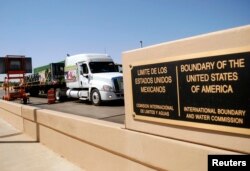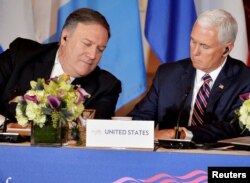The United States is pressing Mexico to keep asylum-seekers on its side of the border, crack down on illegal people smugglers, and tighten controls on migrants on the U.S.-Mexico border.
Top U.S. and Mexican officials are meeting Wednesday in Washington about President Donald Trump's threatened 5% tariff on imported products from Mexico if it does not curb the surge of Central American migrants heading north toward the United States.
But the high-level U.S.-Mexico talks on immigration wrapped up without reaching a deal, according to NBC News.
With Trump in Europe for 75th anniversary commemorations of D-Day, Vice President Mike Pence and Secretary of State Mike Pompeo are talking at the White House with Mexican Foreign Minister Marcelo Ebrard and other officials.
The State Department said Pompeo is having a one-on-one meeting with Ebrard following the meetings at the White House on trade and immigration.
To curb the influx of migrants — mostly from Central America — the two neighboring countries have been discussing a proposed "safe third country" agreement that could significantly reduce the flow of asylum seekers who journey through Mexico and cross illegally into the U.S.
A "safe third country" deal between Mexico and the U.S. would require asylum-seekers from Central America to apply for protection in Mexico rather than at the U.S. border.
Mexican officials have rejected the proposal.
In Ireland, Trump said, "I think Mexico has to step up and if they don't, tariffs will go on and if they go high, companies are going to move back into the United States."
Trump said Mexico "wants to make a deal," but that if it cannot stop the migration, "we just won't be able to do business. It's a very simple thing. And I think they will stop it ... They've sent their top people to try and do it. We'll see what happens today. We should know something."
National security concerns
In advance of the talks, a White House official said on condition of anonymity, "Trade and all other aspects of our relationship are critically important, but national security comes first and the White House is dead serious about moving forward with tariffs if nothing can be done to stem the flow of migrants."
The official said Pence "is eager to hear what tangible measures the Mexican government is prepared to take to immediately address this growing crisis" at the border. In some recent months, U.S. authorities say that more than 100,000 undocumented migrants, mostly from Guatemala, Honduras and El Salvador, have crossed into the U.S. to look for work and escape violence and poverty in their homelands.
In May, the government said Wednesday, 144,000 migrants were detained at the border, up 32% from April. It was the highest monthly figure in 13 years.
Trump this week said he is "more likely" than not to impose the new tariff next Monday, and ramp it up in 5% increments each succeeding month until Mexico controls the flow of migrants. Mexico says the tariffs would hurt the economies in both countries, which are major trading partners, and would not do anything to cut the stream of migrants.
Republicans warn Trump
Some Republican lawmakers, normally close political allies of Trump, have said they will try to block the tariffs with legislation, which also would draw wide support from opposition Democrats. Numerous lawmakers fear rising consumer costs for Americans if the tariffs are imposed on Mexican goods, including cars and numerous food products exported to the U.S.
Trump said Republicans would be "foolish" to try to stop him from imposing the tariffs.
Republican Sen. Charles Grassley predicted that Mexico and the U.S. would reach a deal on the migrants to avert imposition of the tariffs. But one Trump ally, Republican Sen. Lindsey Graham, said, "I support President Trump's decision to impose tariffs on Mexico until they up their game to help us with our border disaster. The illegal flows from Central America must stop and Mexico needs to do more."
Senate Democratic leader Charles Schumer on Tuesday said he thinks Trump is bluffing about imposing the tariffs.
Trump, in Europe, quickly rebuffed the New York lawmaker, saying on Twitter, "Can you imagine Cryin’ Chuck Schumer saying out loud, for all to hear, that I am bluffing with respect to putting Tariffs on Mexico. What a Creep. He would rather have our Country fail with drugs & Immigration than give Republicans a win. But he gave Mexico bad advice, no bluff!"






